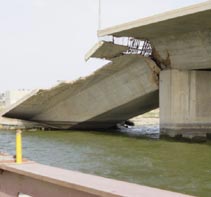|
Al-Basra
Stands Ready For Revenge
 |
|
One
of several buildings bombed by Anglo-American aircraft
|
By
Abdul Raheem Ali, Special From Iraq
ALBASRA,
Iraq, March 11 (IslamOnline.net) – Vigilance and alert are the main
features of the Iraqi southern city of Al-Basra, one of Iraq’s most
important and ancient cities, days after U.S. troops had made a number
of big holes in the huge electrified barbed-wire fence separating the
Iraqi and Kuwaiti borders.
Taking
a taxi with an Iraqi colleague, I arrived at the Iraq military post
bombarded by the U.S.-British warplanes few days ago, leaving 51 Iraqis
killed, including 45 servicemen and six civilians.
On
the way to the post, the taxi driver told me how desperate the people of
Al-Basra were to the extent that they were running out of patience,
hoping to fight the U.S. troops as soon as possible no matter what the
outcome would be.
“The
matter is completely different compared to the situation in 1991…This
time we are more determined and steadfast than never before.
“We
have unshakable belief that the Americans are doing injustice to us and
they just want to bully us,” said Abu Amr.
“Every
one here (in Al-Basra) has more than one weapon to defend his family,
let alone the Iraqi army, Al-Quds army (formed by the Iraqi president to
defend al-Quds) and volunteers,” he added.
We
also came across some people who were digging trenches and piling up
sandbags on the entrances of the residential areas.
We
were visiting the area to see mind-boggling wreckage exacted by the
so-called “sons of Uncle Sam,” who tirelessly claimed they were the
“symbol of civilization and democracy.”
I
asked the driver to take me to one of the Iraqi clans in the area. I was
terrified by a long and panicking whistle but calmed down when the
driver told me “do not worry…It is a U.S. raid and this alarm means
that it has not finished yet.”
We
went to meet Sheikh Kazem Aboud al-Qatrani, who was readying himself for
the Noon prayer.
The
mosque, no surprise, was brimming with people, who resorted to Allah
Almighty to help them overcome their plight.
“Sometimes,
such as the Sunset prayer, you cannot find a foothold to pray. Most of
the people are in their 20s and 30s. They were not used to praying
before 1991,” said Anour Abdallah, the Imam of the mosque.
 |
|
A
bridge destroyed by hostile jet fighters
|
The
looming war, in effect, did the Iraqi people a favor. It cemented their
torn bonds, did away with their past clashes and made them all, whether
Shiites or Sunnis, preoccupied with only one thing: doing their best to
stand up to the U.S.-led invasion.
“Before
the latest crisis, the Shiites were extremely fanatic and never allowed
the Sunnis to work with them…But the U.S. threats compelled us to act
in concert.
“You
can see now committees set up by the two communities to study the
situation properly and agree upon guidelines to combat the coming
invaders,” said Abu Amr.
I
asked Sheikh Qatrani to give us some insights on the clans’ position
in the Iraq standoff.
He
told us that every single house in Al-Basra wants to take revenge from
the United States for killing and injuring hundreds of Iraqi people by
its round-the-clock incursions.
“Many
people, particularly children, were also affected by cancer due to the
deadly depleted uranium used by the Americans during the second Gulf
War.
“If
it had not been for Allah and the scorching heat of the sun, a human and
environmental disaster would have taken place,” said Qatrani.
“We
have a burning desire to fight the Americans. When they come, we will
teach them a lesson that they will never forget. We are going to take
them by surprise in the days to come,” he vowed.
Then
we went to Al-Basra market, where we found a lot of people buying
foodstuffs to stockpile them in the event of war.
“It
was a bustling market best known for its high-quality dates…But it is
now all but gone. God damn the U.S. blockade…We pray that Allah would
protect us from the evil plans of (U.S. President George W.) Bush and
bring back the good old days of prosperity,” said Hajj Shamri, a
seller.
I
walked out from the market to catch my plane. On my way to the airport,
the driver told me about how many acres of gardens and land were
devastated by the U.S. raids.
Wide
swathes of desert have replaced the once green and fertile soil of
Al-Basra, the first city established by Arabs at the advent of Islam.
|